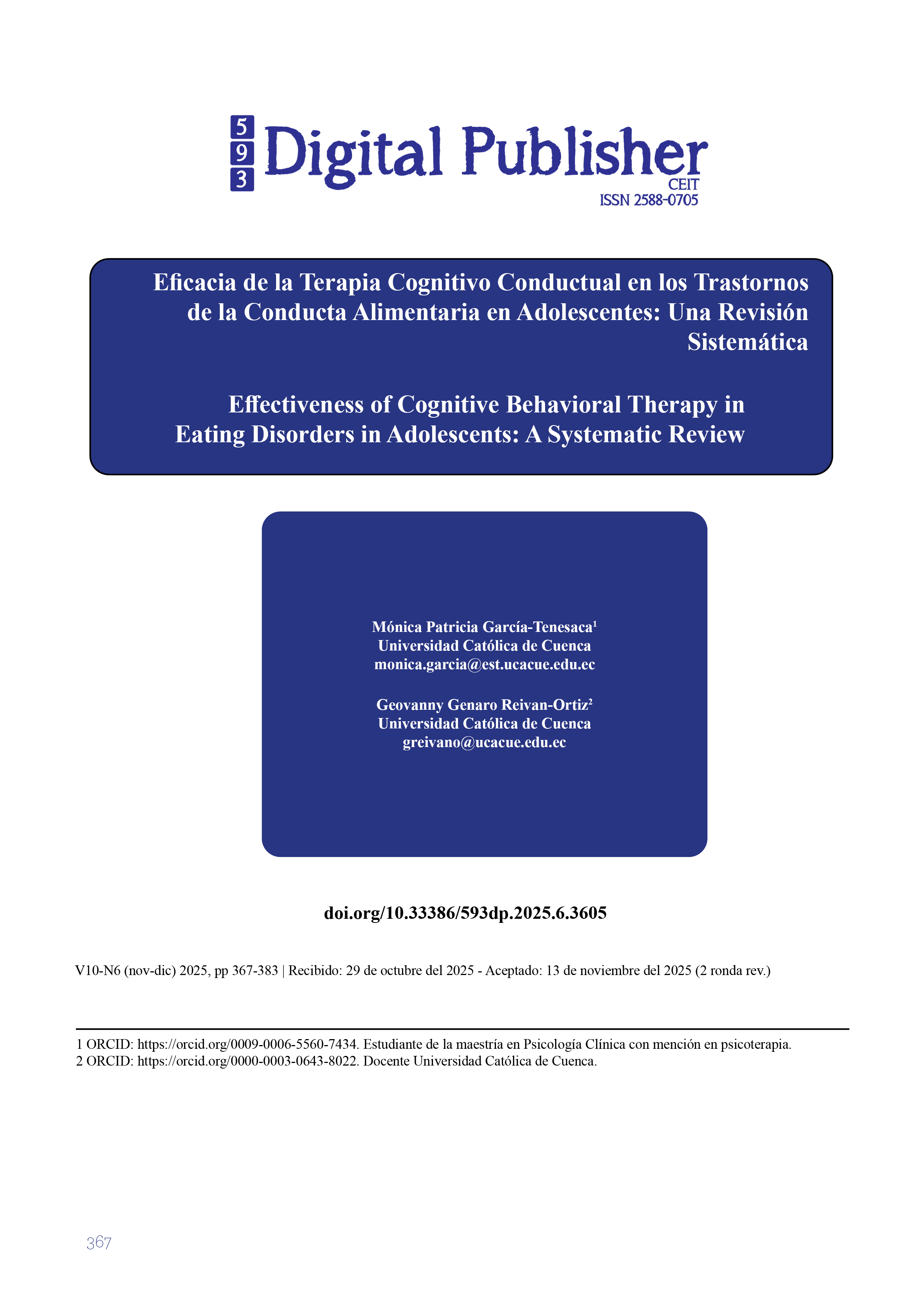Eficacia de la Terapia Cognitivo Conductual en los Trastornos de la Conducta Alimentaria en Adolescentes: Una Revisión Sistemática
Main Article Content
Abstract
Eating disorders (EDs) are considered serious multifactorial psychological illnesses that mainly affect adolescents and are characterized by alterations in food intake, as well as irrational thoughts associated with weight, body image, and food, resulting in maladaptive behaviors. Given their impact on the physical and mental health of adolescents, it is crucial to evaluate the effectiveness of Cognitive Behavioral Therapy (CBT) in Eating Disorders in Adolescents as an intervention plan. Therefore, this research is consolidated by Randomized Clinical Trials published from 2015 to 2025 and registered in scientific databases such as Scopus, Pubmed, and ScienceDirect, using Rayyan for the classification of studies, PRISMA 2020 for the selection, and CONSORT 2010 and AMSTAR 2 for the evaluation of the methodological quality of the selected articles. In the end, six studies met the inclusion criteria. The findings of this systematic review demonstrate the effectiveness of CBT in reducing symptoms of EDs such as binge eating, purging behaviors, preoccupation with food, weight, body image, and low self-esteem, as well as comorbid disorders such as depression and anxiety. It is worth mentioning that interventions involving the family achieve better results in the remission of symptoms typical of EDs.
Downloads
Article Details

This work is licensed under a Creative Commons Attribution-NonCommercial-ShareAlike 4.0 International License.
1. Derechos de autor
Las obras que se publican en 593 Digital Publisher CEIT están sujetas a los siguientes términos:
1.1. 593 Digital Publisher CEIT, conserva los derechos patrimoniales (copyright) de las obras publicadas, favorece y permite la reutilización de las mismas bajo la licencia Licencia Creative Commons 4.0 de Reconocimiento-NoComercial-CompartirIgual 4.0, por lo cual se pueden copiar, usar, difundir, transmitir y exponer públicamente, siempre que:
1.1.a. Se cite la autoría y fuente original de su publicación (revista, editorial, URL).
1.1.b. No se usen para fines comerciales u onerosos.
1.1.c. Se mencione la existencia y especificaciones de esta licencia de uso.
References
Arija Val, V., Santi Cano, M. J., Novalbos Ruiz, J. P., Canals, J., & Rodríguez Martín, A. (2022). Characterization, epidemiology and trends of eating disorders. Nutrición Hospitalaria. https://doi.org/10.20960/nh.04173
Ayrolles, A., Clarke, J., Godart, N., André-Carletti, C., Barbe, C., Bargiacchi, A., Blanchet, C., Bergametti, F., Bertrand, V., Caldagues, E., Caquard, M., Castellotti, D., Delorme, R., Dreno, L., Landou, D. F., Gerardin, P., Guessoum, S., Gicquel, L., Léger, J., … Stordeur, C. (2024). Early-onset anorexia nervosa: a scoping review and management guidelines. Journal of Eating Disorders, 12(1), 182. https://doi.org/10.1186/s40337-024-01130-9
Baile, J. I., & Rabito-Alcón, M. F. (2022). Cognitive Behavioural Therapy for an Adolescent with Anorexia Nervosa. Children, 9(1), 92. https://doi.org/10.3390/children9010092
Bermúdez Durán, L. V., Chacón Segura, M. A., & Rojas Sancho, D. M. (2021). Actualización en trastornos de conducta alimentaria: anorexia y bulimia nerviosa. Revista Médica Sinergia, 6(8), e753. https://doi.org/10.31434/rms.v6i8.753
Biney, H., Giles, E., Hutt, M., Matthews, R., & Lacey, J. H. (2022). Self-esteem as a catalyst for change in adolescent inpatients with anorexia nervosa: a pilot randomised controlled trial. Eating and Weight Disorders - Studies on Anorexia, Bulimia and Obesity, 27(1), 189–198. https://doi.org/10.1007/s40519-021-01161-0
Bohon, C. (2019). Binge Eating Disorder in Children and Adolescents. Child and Adolescent Psychiatric Clinics of North America, 28(4), 549–555. https://doi.org/10.1016/j.chc.2019.05.003
Chahuan, J., Rey, P., & Monrroy, H. (2021). Síndrome de rumiación. Artículo de revisión. Revista de Gastroenterología de México, 86(2), 163–171. https://doi.org/10.1016/j.rgmx.2020.11.001
D’Adamo, L., Laboe, A., Goldberg, J., Howe, C., Fennig, M., DePietro, B., Firebaugh, M.-L., Cooper, Z., Wilfley, D., & Fitzsimmons-Craft, E. (2024). Development and usability testing of an online platform for provider training and implementation of cognitive-behavioral therapy guided self-help for eating disorders. https://doi.org/10.21203/rs.3.rs-4409969/v1
Escandón Nagel, N., & Garrido-Rubilar, G. (2021). Trastorno por Atracón: una mirada integral a los factores psicosociales implicados en su desarrollo. Nutrición Clínica y Dietética Hospitalaria, 40(4). https://doi.org/10.12873/404escandon
Fonseca, N. K. O., Curtarelli, V. D., Bertoletti, J., Azevedo, K., Cardinal, T. M., Moreira, J. D., & Antunes, L. C. (2024). Avoidant restrictive food intake disorder: recent advances in neurobiology and treatment. Journal of Eating Disorders, 12(1), 74. https://doi.org/10.1186/s40337-024-01021-z
Gaete, M. V., López, C., & Matamala, M. (2012). Trastornos de la conducta alimentaria en adolescentes y jóvenes. Revista Médica Clínica Las Condes, 23(5), 579–591. https://doi.org/10.1016/S0716-8640(12)70352-8
González Tuta, D. F., Barreto Porez, A. P., & Salamanca Camargo, Y. (2017). Terapia Cognitiva: Antecedentes, teoría y metodología [Investigación documental]. Revista Iberoamericana de Psicología, 10(2), 99–107. https://doi.org/10.33881/2027-1786.rip.10211
Hartmann, A. S., Poulain, T., Vogel, M., Hiemisch, A., Kiess, W., & Hilbert, A. (2018). Prevalence of pica and rumination behaviors in German children aged 7–14 and their associations with feeding, eating, and general psychopathology: a population-based study. European Child & Adolescent Psychiatry, 27(11), 1499–1508. https://doi.org/10.1007/s00787-018-1153-9
Hilbert, A., Petroff, D., Neuhaus, P., & Schmidt, R. (2020). Cognitive-Behavioral Therapy for Adolescents with an Age-Adapted Diagnosis of Binge-Eating Disorder: A Randomized Clinical Trial. Psychotherapy and Psychosomatics, 89(1), 51–53. https://doi.org/10.1159/000503116
Keegan, E., Waller, G., Tchanturia, K., & Wade, T. D. (2024). The potential value of brief waitlist interventions in enhancing treatment retention and outcomes: a randomised controlled trial. Cognitive Behaviour Therapy, 53(6), 608–620. https://doi.org/10.1080/16506073.2024.2351867
Le Grange, D., Lock, J., Agras, W. S., Bryson, S. W., & Jo, B. (2015). Randomized Clinical Trial of Family-Based Treatment and Cognitive-Behavioral Therapy for Adolescent Bulimia Nervosa. Journal of the American Academy of Child & Adolescent Psychiatry, 54(11), 886-894.e2. https://doi.org/10.1016/j.jaac.2015.08.008
Lin, B. Y., Moog, D., Xie, H., Sun, C.-F., Deng, W. Y., McDaid, E., Liebesny, K. V, Kablinger, A. S., & Xu, K. Y. (2024). Increasing prevalence of eating disorders in female adolescents compared with children and young adults: an analysis of real-time administrative data. General Psychiatry, 37(4), e101584. https://doi.org/10.1136/gpsych-2024-101584
Love, M., & Baudinet, J. (2025). Treatment outcomes for adolescent bulimia nervosa: a systematic scoping review of quantitative findings. Journal of Eating Disorders, 13(1), 68. https://doi.org/10.1186/s40337-025-01236-8
Medina-Tepal, K. A., Vázquez-Arévalo, R., López-Aguilar, X., & Mancilla-Díaz, J. M. (2021). Conductas asociadas a los trastornos de pica, rumiación y evitación/restricción de alimentos en adolescentes. Psicología y Salud, 31(2), 203–214. https://doi.org/10.25009/pys.v31i2.2689
Murphy, R., Straebler, S., Cooper, Z., & Fairburn, C. G. (2010). Cognitive Behavioral Therapy for Eating Disorders. Psychiatric Clinics of North America, 33(3), 611–627. https://doi.org/10.1016/j.psc.2010.04.004
Murray, H. B., Juarascio, A. S., Di Lorenzo, C., Drossman, D. A., & Thomas, J. J. (2019). Diagnosis and Treatment of Rumination Syndrome: A Critical Review. American Journal of Gastroenterology, 114(4), 562–578. https://doi.org/10.14309/ajg.0000000000000060
Nyman-Carlsson, E., Norring, C., Engström, I., Gustafsson, S. A., Lindberg, K., Paulson-Karlsson, G., & Nevonen, L. (2020). Individual cognitive behavioral therapy and combined family/individual therapy for young adults with Anorexia nervosa: A randomized controlled trial. Psychotherapy Research, 30(8), 1011–1025. https://doi.org/10.1080/10503307.2019.1686190
Ouzzani, M., Hammady, H., Fedorowicz, Z., & Elmagarmid, A. (2016). Rayyan—a web and mobile app for systematic reviews. Systematic Reviews, 5(1), 210. https://doi.org/10.1186/s13643-016-0384-4
Page, M. J., McKenzie, J. E., Bossuyt, P. M., Boutron, I., Hoffmann, T. C., Mulrow, C. D., Shamseer, L., Tetzlaff, J. M., Akl, E. A., Brennan, S. E., Chou, R., Glanville, J., Grimshaw, J. M., Hróbjartsson, A., Lalu, M. M., Li, T., Loder, E. W., Mayo-Wilson, E., McDonald, S., … Moher, D. (2021). The PRISMA 2020 statement: An updated guideline for reporting systematic reviews. PLOS Medicine, 18(3), e1003583. https://doi.org/10.1371/journal.pmed.1003583
Rodríguez-Riesco, L., Vivas, S., Mateos Herrera, A., Pérez-Calvo, C., & Ruiz-Duet, A. (2022). Behavior therapy: roots, evolution and reflection on the relevance of behaviorism in the clinical context. Papeles Del Psicólogo - Psychologist Papers, 43(3), 209. https://doi.org/10.23923/pap.psicol.2994
Schulz, K. F., Altman, D. G., & Moher, D. (2010). CONSORT 2010 Statement: updated guidelines for reporting parallel group randomised trials. BMJ, 340(mar23 1), c332–c332. https://doi.org/10.1136/bmj.c332
Terreros, P. (2023). Técnicas cognitivo conductuales en el tratamiento de la Bulimia Nerviosa, mini-review. Revista Medica HJCA, 15(2), 74–79. https://doi.org/10.14410/2023.15.2.rb.12
Thomas, J. J., Wons, O. B., & Eddy, K. T. (2018). Cognitive–behavioral treatment of avoidant/restrictive food intake disorder. Current Opinion in Psychiatry, 31(6), 425–430. https://doi.org/10.1097/YCO.0000000000000454
Tinahones, F. J., & Gonzalo-Marín, M. (2004). Abordaje de los trastornos de la conducta alimentaria. Endocrinología y Nutrición, 51(4), 225–229. https://doi.org/10.1016/S1575-0922(04)74609-4
Valenzuela, F., Lock, J., Le Grange, D., & Bohon, C. (2018). Comorbid depressive symptoms and self‐esteem improve after either cognitive‐behavioural therapy or family‐based treatment for adolescent bulimia nervosa. European Eating Disorders Review, 26(3), 253–258. https://doi.org/10.1002/erv.2582
Vogel, E. N., Singh, S., & Accurso, E. C. (2021). A systematic review of cognitive behavior therapy and dialectical behavior therapy for adolescent eating disorders. Journal of Eating Disorders, 9(1), 131. https://doi.org/10.1186/s40337-021-00461-1
Wilson, G. T., Wilfley, D. E., Agras, W. S., & Bryson, S. W. (2010). Psychological Treatments of Binge Eating Disorder. Archives of General Psychiatry, 67(1), 94. https://doi.org/10.1001/archgenpsychiatry.2009.170
Young, S. L. (2010). Pica in Pregnancy: New Ideas About an Old Condition. Annual Review of Nutrition, 30(1), 403–422. https://doi.org/10.1146/annurev.nutr.012809.104713



